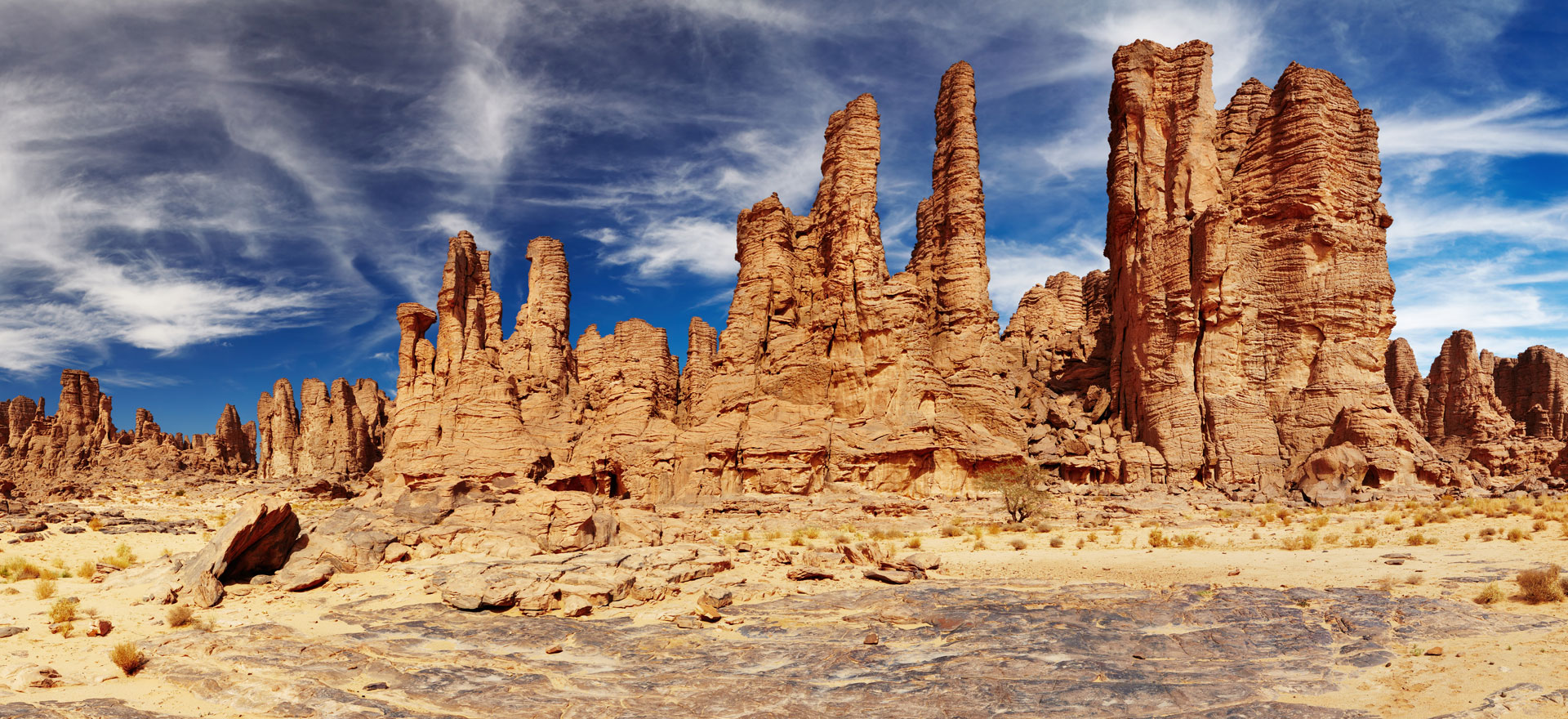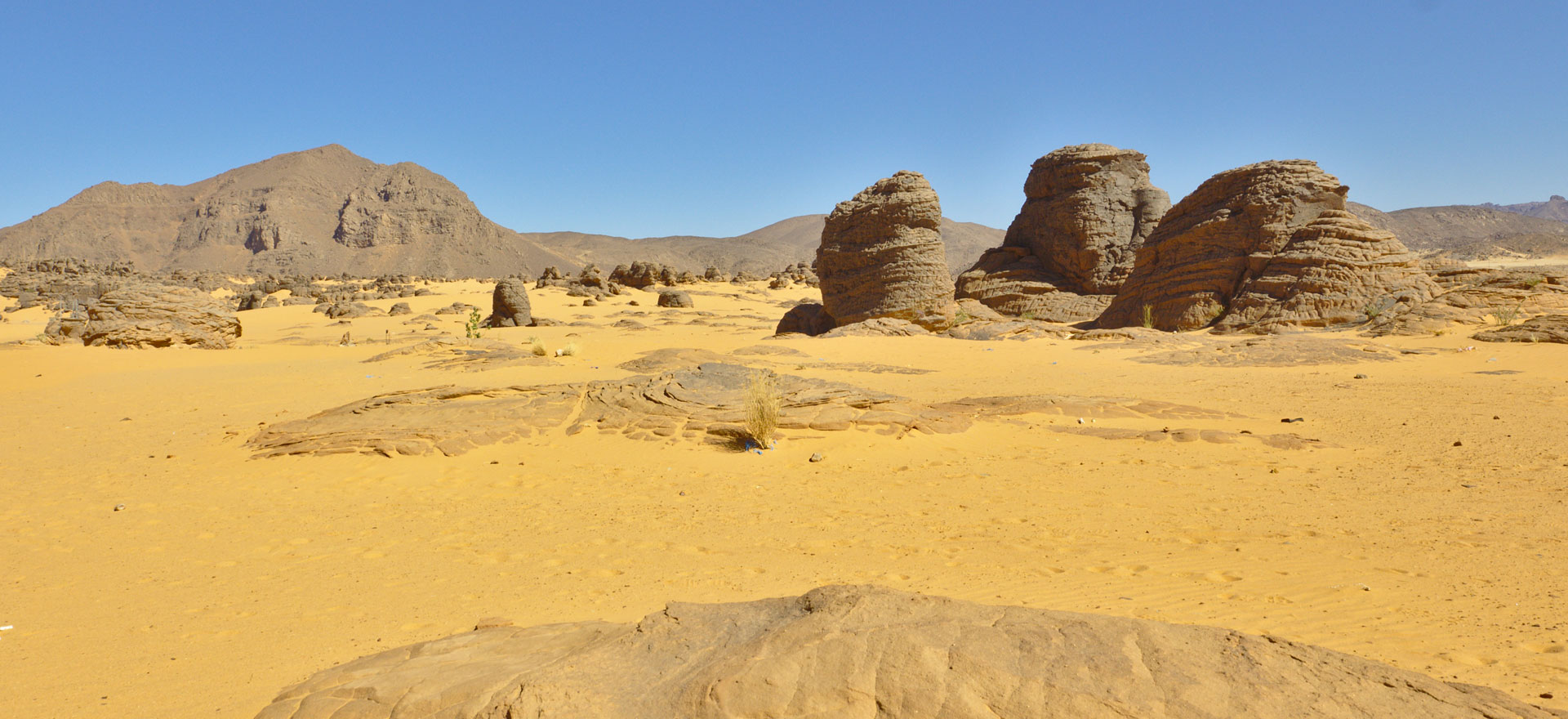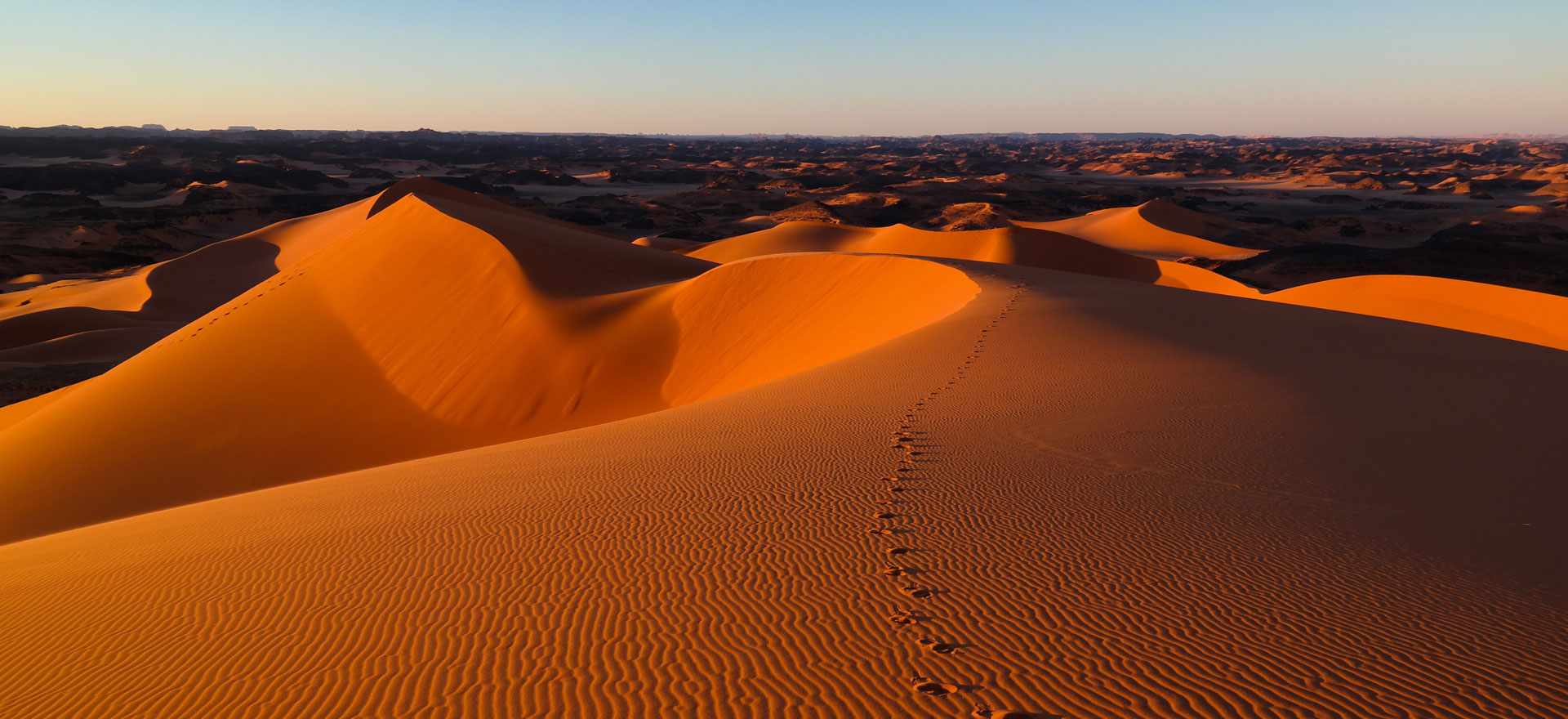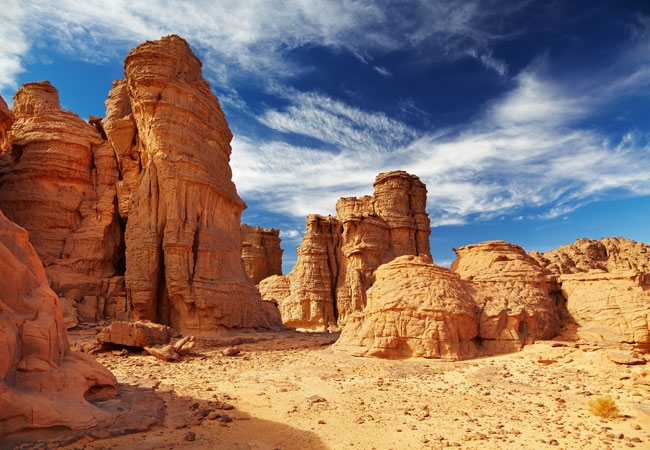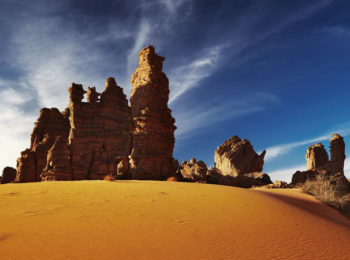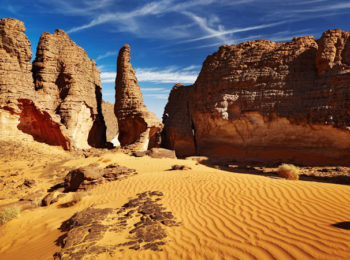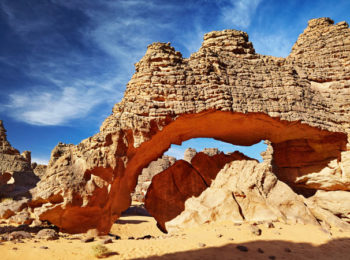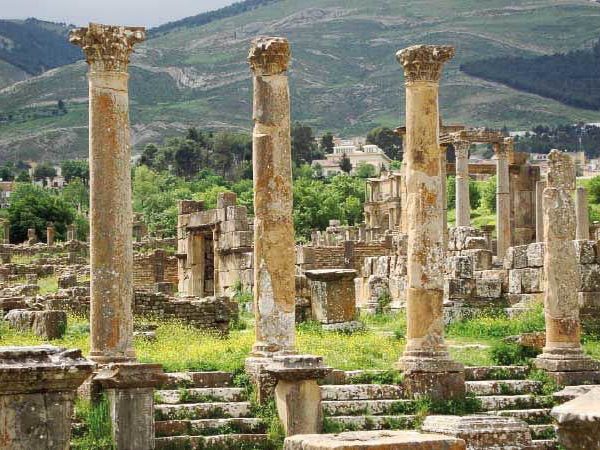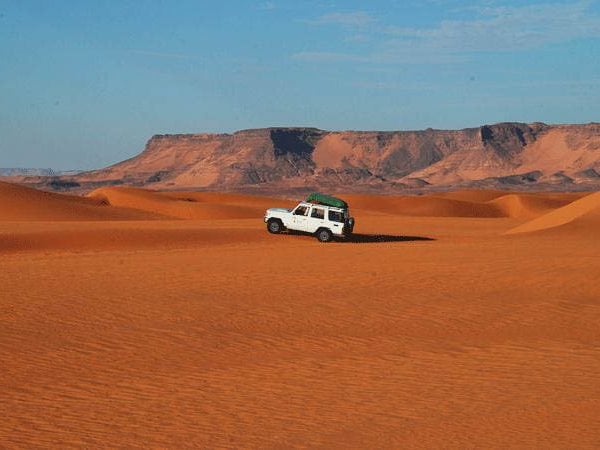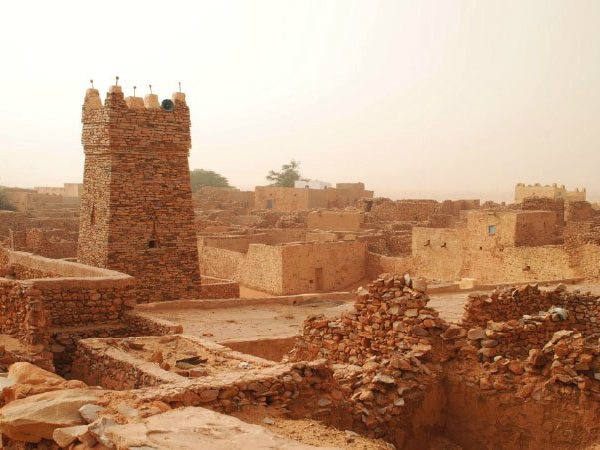Day 2 - Algiers - Djanet
A full day exploring this enigmatic city. We visit the UNESCO listed casbah area, the most traditional part of the city as well as the Museum of Antiquities and the renowned Bardo Museum, among other sites. Later transfer to the airport to fly to Djanet. Overnight simple hotel. (BD)
Day 4 - Idaren Gorge
Walk into the Idaren Gorge, a beautiful spot with rare patches of water and reedbeds. We have time to explore some of the gueltas (waterholes) in the area and there may be time for a swim. Overnight camping. (BLD)
Please note: this is a full day walk and particularly challenging, so may not be suitable for everyone. You can choose to opt out if you don’t feel comfortable with this.
Day 5 - Dider – Erg Admer
We take a morning walk along another gorge near Iherir and discover the palace ruins and various rock art sites here. Continue to Dider, home to the engravings of Tin-Aghrem, and onwards to the Erg Admer, an ocean of sand, where we spend time exploring its dunes. Overnight camping. (BLD)
Day 8 - In Djaren
Cross the striking dunes of Moul Enaga, enjoying spectacular views of the Tadrart on our way to In Djaren, where we explore its rock carvings on foot and by vehicle. Overnight camping. (BLD)
Day 9 - In Djaren – Tin Merzouga
Explore the beautiful valley of In Djaren, then head into the impressive sand dunes of Tin Merzouga, some of the highest in the region. Climb up the dunes for sunset, for spectacular views over the surrounding desert. Overnight camping. (BLD)
Day 10 - Tin Merzouga – In Tehaq
Visit an impressive nearby canyon with its caves, sandstone towers and valleys, before continuing onto the dunes of In Tehaq, which we explore by foot. Overnight camping. (BLD)
Day 11 - In Tehaq – The Black Dunes
Spend the morning discovering the many paintings and rock engravings of the Djaren valley, with a visit to the Tin Abbaden Canyon. Later we make our way to the Black Dunes where we will stay tonight. Overnight camping. (BLD)
Day 12 - Djanet
Today we leave the Tadrart behind and start our return journey to Djanet, visiting the renowned ‘crying cow’ en route. Overnight simple hotel. (BLD)
What's included?
What's not included?
Visas
All travellers will require a visa to enter Algeria. For visits to Southern Algeria, it is possible to obtain a visa on arrival and we can make the arrangements for this. Visa regulations can change however and so we recommend that you contact your nearest embassy for the most up to date information.
Health and vaccinations
We are not medically qualified and so we recommend that you speak to your doctor or nearest health professional for advice concerning recommended vaccinations. For more advice on vaccinations you can also visit www.fitfortravel.nhs.uk.
If you have any physical limitations that might impact your ability to participate in the planned tour activities, it’s essential that you make us aware as soon as possible so that we can discuss this with you.
Insurance
It is a condition of joining our tours that you have suitable travel insurance in place, and we cannot accept travellers without insurance. All policies differ in terms of what they will cover, but as a minimum you need medical and health cover which will cover you for the whole time that you are away. Most policies will also include cancellation cover, which will cover you if an unforeseen circumstance obliges you to cancel your trip. We recommend that you obtain your insurance as soon as you book your trip.
Please note that government travel warnings often affect the validity of your travel insurance, and you should check this with your insurance company.
Money
The local currency in Algeria is the Algerian dinar. It is best to bring Euros for exchange purposes.
It’s not difficult to change money in Algeria, either at banks or the hotels and your guide can assist with this. Algeria is very much a cash society – credit cards are not widely accepted, and ATM machines are not especially reliable.
When to go
As the largest country in Africa, Algeria experiences a number of different climate zones. The best time to visit the Sahara is the winter, when temperatures are at their least oppressive, but at this time the Mediterranean coast will most likely be cold and wet. The best times to visit are spring and autumn, when it’s not too hot in the desert nor too cold in the north.
Local conditions
When travelling to some of the destinations we offer you need to bear in mind that things won’t always work here as we’re used to them working at home. Travelling in underdeveloped and untouristed destinations requires both patience and a sense of humour. There may be problems with infrastructure, attitudes may be different, and maintenance may not be as high a standard as we would always like, but this is very much part and parcel of travelling in such a place. We aim to resolve any issues as quickly as possible, and thank you for your patience.
Before travelling here you should be aware that Algeria is an emerging destination for tourism, and services here can in no way be compared to more popular North African destinations such as Morocco, Tunisia or Egypt. The choice of appropriate accommodation in some towns and cities (particularly the smaller places) can be limited, and standards of both service and maintenance can be less than polished. Guides and other service providers in Algeria also do not have the decades of collective practice and experience that their counterparts in neighbouring countries can draw upon. Travelling here requires accepting that there may be some shortcomings at times, although of course we are constantly working to improve this. This is part of travelling in a destination that is comparatively new to tourism – if you do not feel that this is for you, we suggest waiting until tourism is much more established in Algeria.
Travel advice
We keep a very close eye on the travel advice issued by the UK Foreign and Commonwealth Office so that we can keep you up to date with any warnings. At the time of writing the FCO advises against all travel to areas within 30km of the border with Libya, which we visit on our tours of Southern Algeria.
We work very closely with our local team and are fully confident that we can operate tours safely in Algeria. Should you have any concerns over safety please do not hesitate to contact us and we can address your concerns.
This relates to advice from the British government – other nationalities need to check the stance of their own governments.
Please note that the information contained above is highly susceptible to change, and while we endeavour to keep up to date we recommend that you use this as a guide only. Should you have any questions, please don’t hesitate to contact us.

